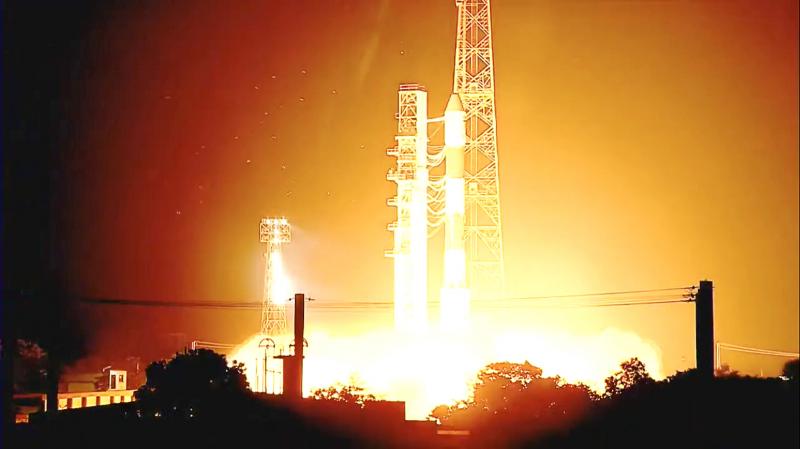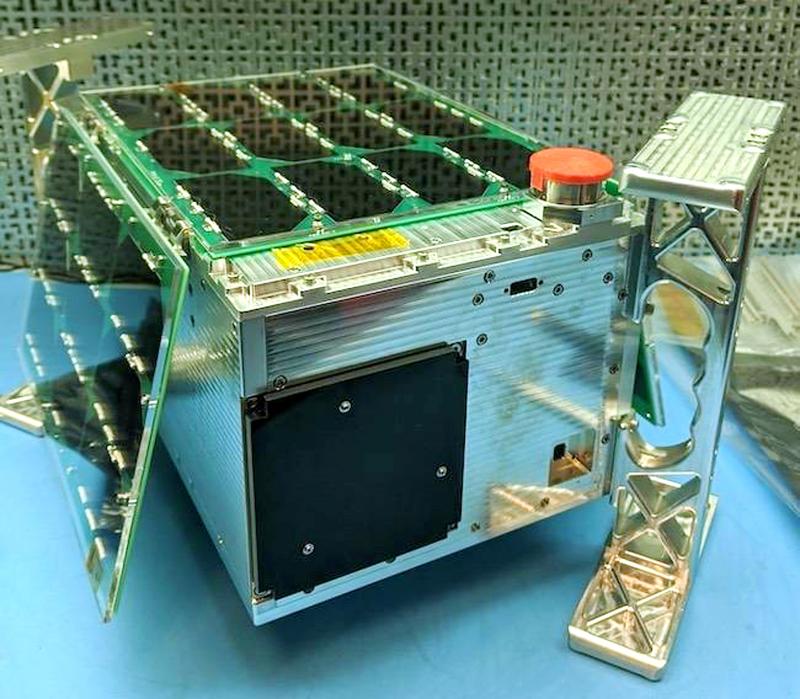A scientific microsatellite jointly developed by institutions in Taiwan, the US and India was launched yesterday morning, representing a major milestone in scientific collaboration and the nation’s achievements in space research.
The INSPIRESat-1 microsatellite was launched at 8:29am Taipei time from Satish Dhawan Space Centre in Sriharikota, India.
The US received a signal from the satellite when it passed overhead at 9:30am, while Taiwan is expected to detect a signal at about 5pm today.

Photo: screen grab from ISRO live-streaming
It is to remain in sun-synchronous orbit at an altitude of 525km, where it is to collect data for participating institutions to use in scientific research.
The satellite has a mission life of one year and a primary minimum requirement of six months for science operations.
The successful launch is the culmination of four years of collaborative research and development under the International Satellite Program in Research and Education (INSPIRE), a consortium of universities with space science departments.

Photo courtesy of the University of Colorado LASP
It also marks the first collaboration between a Taiwanese academic institution, National Central University (NCU) and the Indian Space Research Organization, which was responsible for launching the satellite on its Polar Satellite Launch Vehicle.
The Indian Institute of Space Science and Technology has primary flight control, with assistance by NCU and the University of Colorado, Boulder.
One of its two major payloads is a compact ionospheric probe developed by NCU for studying the Earth’s dynamic ionosphere.
The other is a dual-zone aperture X-ray solar spectrometer developed by the University of Colorado, Boulder, with funding from NASA for studying highly variable solar X-ray radiation, together forming a kind of space weather station.
In a news release, the Ministry of Science and Technology touted federal programs that supported NCU professor Loren Chang (張起維) as he pursued the collaboration.
The government encourages academics to participate in cross-national research as a way to contribute to global knowledge and enhance the influence of Taiwan’s scientific achievements, the ministry said.
Space technology is an important indicator of the nation’s strength in scientific research, it said.
Looking ahead to the future of the space industry, Taiwan has long invested in research and talent in the field, it said.
Last year also saw the passage of the Space Development Act (太空發展法), which combines the strengths of industry, government and academia to develop a blueprint for space development to rival cutting-edge international missions, it added.

Taiwan has received more than US$70 million in royalties as of the end of last year from developing the F-16V jet as countries worldwide purchase or upgrade to this popular model, government and military officials said on Saturday. Taiwan funded the development of the F-16V jet and ended up the sole investor as other countries withdrew from the program. Now the F-16V is increasingly popular and countries must pay Taiwan a percentage in royalties when they purchase new F-16V aircraft or upgrade older F-16 models. The next five years are expected to be the peak for these royalties, with Taiwan potentially earning

STAY IN YOUR LANE: As the US and Israel attack Iran, the ministry has warned China not to overstep by including Taiwanese citizens in its evacuation orders The Ministry of Foreign Affairs (MOFA) yesterday rebuked a statement by China’s embassy in Israel that it would evacuate Taiwanese holders of Chinese travel documents from Israel amid the latter’s escalating conflict with Iran. Tensions have risen across the Middle East in the wake of US and Israeli airstrikes on Iran beginning Saturday. China subsequently issued an evacuation notice for its citizens. In a news release, the Chinese embassy in Israel said holders of “Taiwan compatriot permits (台胞證)” issued to Taiwanese nationals by Chinese authorities for travel to China — could register for evacuation to Egypt. In Taipei, the ministry yesterday said Taiwan

Taiwan is awaiting official notification from the US regarding the status of the Agreement on Reciprocal Trade (ART) after the US Supreme Court ruled US President Donald Trump's global tariffs unconstitutional. Speaking to reporters before a legislative hearing today, Premier Cho Jung-tai (卓榮泰) said that Taiwan's negotiation team remains focused on ensuring that the bilateral trade deal remains intact despite the legal challenge to Trump's tariff policy. "The US has pledged to notify its trade partners once the subsequent administrative and legal processes are finalized, and that certainly includes Taiwan," Cho said when asked about opposition parties’ doubts that the ART was

If China chose to invade Taiwan tomorrow, it would only have to sever three undersea fiber-optic cable clusters to cause a data blackout, Jason Hsu (許毓仁), a senior fellow at the Hudson Institute and former Chinese Nationalist Party (KMT) legislator, told a US security panel yesterday. In a Taiwan contingency, cable disruption would be one of the earliest preinvasion actions and the signal that escalation had begun, he said, adding that Taiwan’s current cable repair capabilities are insufficient. The US-China Economic and Security Review Commission (USCC) yesterday held a hearing on US-China Competition Under the Sea, with Hsu speaking on